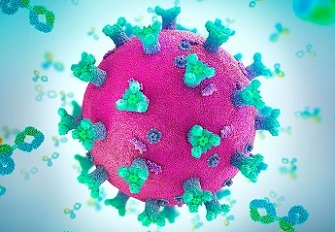Long-COVID and Autoimmune Disease Risk: The Invisible Scourge Unleashed by COVID-19
Long COVID - Autoimmune Disease May 02, 2023 1 year, 11 months, 2 weeks, 4 days, 8 hours, 34 minutes ago
Long COVID: The ongoing saga of the COVID-19 pandemic has unveiled a plethora of previously unknown health complications, and the Long-COVID syndrome is perhaps the most notorious among them. Affecting around 28 to 30% of Americans who have contracted the SARS-CoV-2 virus and about 30 to 33% of Europeans, the lingering effects of
Long COVID such as brain fog, post-exertional malaise, and joint pain continue to haunt millions. Now, emerging research points to an even more sinister aftereffect: a heightened risk of developing autoimmune diseases in individuals who have had COVID-19.

The exact reasons behind this alarming development are still murky, leaving experts grappling for answers.
A previous German study had already warned that viral infections can typically also cause autoimmune conditions in the post-infection stages. According to that study abstract, “Autoimmune diseases are the consequence of a breach in immune tolerance, leading to the inability to sufficiently differentiate between self and non-self. Immune reactions that are targeted towards self-antigens can ultimately lead to the destruction of the host’s cells and the development of autoimmune diseases. Although autoimmune disorders are comparatively rare, the worldwide incidence and prevalence is increasing, and they have major adverse implications for mortality and morbidity. Genetic and environmental factors are thought to be the major factors contributing to the development of autoimmunity. Viral infections are one of the environmental triggers that can lead to autoimmunity. Study data suggests that several mechanisms, such as molecular mimicry, epitope spreading, and bystander activation, can cause viral-induced autoimmunity.”
https://www.mdpi.com/1999-4915/15/3/782
Other recent groundbreaking studies have painted a harrowing picture of the link between COVID-19 and autoimmune diseases. Analyzing medical records from three different countries, these studies compared the incidence of new-onset autoimmune diseases in patients with confirmed COVID-19 against those who had never been diagnosed with the virus.
A Taiwan study, which examined health records of 3.8 million US patients, including over 888,460 COVID-19 positive cases, revealed that the COVID-19 group was two to three times more likely to develop autoimmune diseases like rheumatoid arthritis, systemic lupus erythematosus, and systemic sclerosis.
https://www.thelancet.com/journals/eclinm/article/PIIS2589-5370(22)00512-0/fulltext
Similarly, a UK study involving more than 458,000 COVID-positive individuals showed that they were 22% more likely to develop autoimmune diseases compared to the control group. The most significant associations were found with type 1 diabetes, inflammatory bowel disease, and psoriasis.
https://www.medrxiv.org/content/10.1101/2022.10.06.22280775v1
A German study demonstrated that COVID-19 patients were almost 43% more likely to develop an autoimmune disease compared to those without t
he virus, and the study also showed that COVID-19 was most strongly linked to vasculitis.
https://www.medrxiv.org/content/10.1101/2023.01.25.23285014v1
All these large-scale studies provide irrefutable evidence of the connection between COVID-19 and autoimmune diseases, but this is not the first instance of such a link. Infections like Epstein-Barr virus, hepatitis C, and cytomegalovirus have long been associated with autoimmune diseases, as have bacterial infections like group A streptococcus and salmonella.
The delicate balance between the immune system's ability to clear an infection and the potential to trigger chronic autoimmune diseases is a well-known challenge for physicians, particularly rheumatologists.
The immune system's response to infections like COVID-19, including the extrafollicular activation pathway that produces fast-acting, albeit less specific, antibodies, can lead to a dysregulated response. This reaction may result in high levels of self-targeting antibodies that can damage the body's organs and tissues.
In the case of long-COVID, research suggests that the same autoantibodies driving the initial immune response can linger in the body for months after the infection, although the role of these persistent immune cells in causing long-lasting symptoms remains uncertain. This hyperinflammation can lead to rare but serious complications such as multisystem inflammatory syndrome in children and adults, which usually resolve within six months with no significant long-term effects.
However, it is unclear why acute autoimmunity triggered by COVID-19 becomes chronic in some patients.
One possibility is that individuals who develop autoimmune diseases after COVID-19 were already predisposed to autoimmunity. In some cases, autoantibodies for diseases like type 1 diabetes and lupus can circulate in the body for over a decade before clinical symptoms manifest. These individuals' immune systems may be primed, so when they contract an infection like COVID-19 or encounter an unknown environmental trigger, it pushes them over the edge, leading to full-blown autoimmunity.
The question that remains is whether these patients would have developed clinical autoimmune diseases had they not contracted the virus.
It's crucial to note that the presence of autoantibodies does not necessarily indicate autoimmune disease. Healthy individuals can also have autoantibodies, and everyone develops them as they age. However, the undeniable connection between COVID-19 and the increased risk of autoimmune diseases calls for more comprehensive research, better understanding, and improved public health measures.
The long-COVID syndrome, with its myriad manifestations and potential autoimmune disease risk, underscores the importance of effective COVID-19 management strategies. As the world continues to grapple with the consequences of the pandemic, vigilance in addressing the lingering effects of the virus on survivors is crucial. This includes fostering awareness, providing support to those suffering from long-term consequences, and investing in research to better understand and treat these conditions.
In conclusion, the revelation of an increased risk of autoimmune diseases in COVID-19 survivors highlights the complexity of the virus and its far-reaching effects on human health. It serves as a stark reminder of the importance of ongoing research and global collaboration in the fight against COVID-19 and the need for concerted efforts to mitigate the impacts of the pandemic. As researchers continue to uncover more about the link between COVID-19 and autoimmune diseases, the medical community, policymakers, and the public must join forces to address this invisible scourge.
For the latest on
Long COVID, keep on logging to Thailand Medical News.
